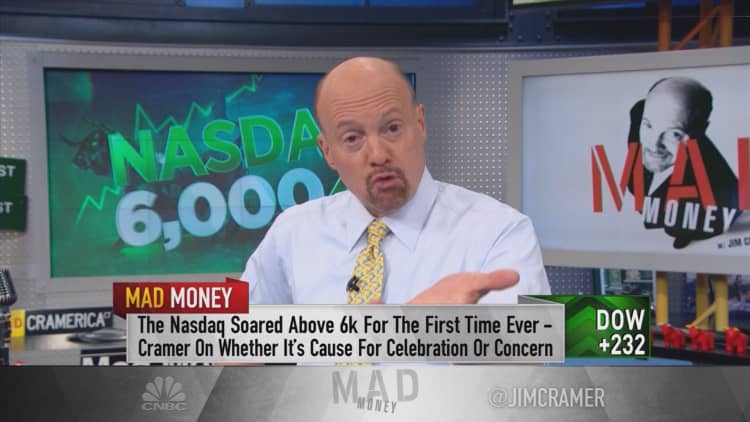
Jim Cramer is always up for analyzing the stock market's valuation when commentary suggests that it has run too far too quickly and is too expensive.
"I want to tackle head-on the notion that the Nasdaq is overvalued, something we heard a lot of chatter about today because the index blasted through the 6000 level, and whenever we crash through big round numbers, it tends to cause instant soul-searching," the "Mad Money" host said.
When the Nasdaq sees a big run, people tend to recall the last time it skyrocketed, Cramer said. In this case, it happens to be early 2000, when the index approached 5000 then dived thousands of points, crushing a whole class of investors.
Watch the full segment here:

To Cramer, the comparison feels somewhat forced. The companies that drove the Nasdaq to 5000 back then ended up either being overvalued or, in Cramer's words, "plain old worthless."
So the "Mad Money" host decided to compare the leading stocks' future price-to-earnings multiples to see whether there is any weight to the argument that today's market is too pricey.
In 2000, tech giants were already running the show. Microsoft traded at 59 times earnings, Cisco at 179 times earnings, Intel at 126 times earnings and Oracle at 87 times earnings.
Now, Microsoft trades at 20 times earnings, Cisco at 13 times earnings, Intel at 17 times earnings, and Oracle at 16 times earnings.
"When you consider that the average stock in the S&P 500 sells for 21 times earnings, not only are these four tech stocks ridiculously undervalued versus their prices back then, they're actually cheaper than the average stock in the S&P right now," Cramer said.
When the tech bubble burst it dragged those market leaders into oblivion. But today, all four are considered value plays complete with regular stock buybacks and good dividends at a fair price.
Cramer understands why some investors worry about market leaders like Amazon and Netflix, which appear to have inflated valuations like the once-doomed tech stocks did in 2000.
But the "Mad Money" host is not convinced that this means the online powerhouses are due for a crash.
"Amazon has the greatest sales momentum of all time," Cramer said. "I've never seen a company this large grow so fast in a market that's worth trillions upon trillions of dollars worldwide."
Even in 2000, investors would pay up to Amazon's multiples for growth. But Cramer noted a key difference: unlike the growth stocks then, Amazon has huge cash flows and makes billions.
"It just chooses to keep spending that money so it can grow even faster," he said.
Netflix strikes Cramer as an opportunity stock, one that has massive growth potential that investors will also cough up cash to buy. As the streaming giant cracks into new global markets, it attracts eager money managers along the way.
Moreover, the other stocks in the Nasdaq's top 10 biggest names are also relatively cheap. Apple trades at 14 times 2018 earnings and has a large dividend, big buyback, and lots of cash.
Alphabet, parent of Google, may seem expensive, but at 18 times earnings is cheaper than the average and also has a mountain of overseas cash as well as a large buyback. Facebook sells at the average price of a Nasdaq stock.
"Now, some of you might say, 'Wait a second, all of these stocks could still prove to be wildly overvalued if the global economy turns upside down,'" Cramer said. "But right now, things seem to be doing just fine, and they could be getting even better if President [Donald] Trump can push his tax cuts and repatriation plans through Congress."
So as the indexes continue to rally, Cramer insists that you do your homework on the companies that market players have deemed too expensive.
"Even though the Nasdaq 100 is up 14 percent year to date, I refuse to call it overvalued not only versus 2000, but compared to many other eras that I have to admit seemed a lot less risky," Cramer said. "One more reason to stay the course and do some buying if this darn market would ever give you a pullback."
Questions for Cramer?
Call Cramer: 1-800-743-CNBC
Want to take a deep dive into Cramer's world? Hit him up!
Mad Money Twitter - Jim Cramer Twitter - Facebook - Instagram - Vine
Questions, comments, suggestions for the "Mad Money" website? madcap@cnbc.com



